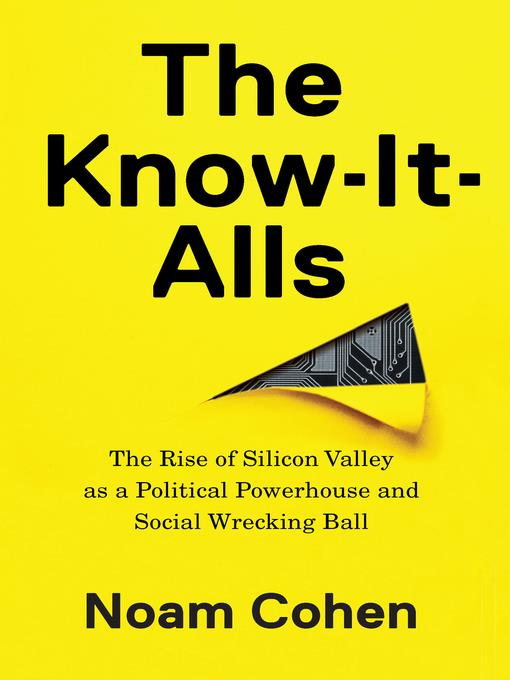
The Know-It-Alls
The Rise of Silicon Valley as a Political Powerhouse and Social Wrecking Ball
کتاب های مرتبط
- اطلاعات
- نقد و بررسی
- دیدگاه کاربران
نقد و بررسی

September 15, 2017
A study of Silicon Valley technology titans and how their narratives of success have influenced political, social, and economic discourse.In a fairly short period of time, roughly 25 years since the internet became accessible to private development, the libertarian-leaning belief system of Silicon Valley has practically become dogma. As former New York Times tech columnist Cohen pointedly shows in his character studies, the clout of tech superstars, the so-called know-it-alls, is based on their winner-take-all vision of society, a meritocratic fantasy that conflates their enormous wealth with individual greatness. Aside from their libertarian narrative of success, a chief principle of their belief is disruption. The concept has become so ingrained in contemporary culture that it has even infected politics, giving rise to outsider politicians such as Donald Trump, whom PayPal co-founder Peter Thiel openly endorsed. The goal of disruption is a conceited effort to upset the status quo, or established order, regardless of how successful or popular it may be. It might be tempting to characterize Cohen as a Luddite with an ax to grind, but he shows how the cult of personality for tech entrepreneurs developed out of a "combination of a hacker's arrogance and an entrepreneur's greed" and they have selfishly exploited technological advances for personal gain. Beginning with researcher and early artificial intelligence advocate John McCarthy, the author devotes each chapter to a specific CEO or mega-investor--including Facebook's Mark Zuckerberg, Microsoft's Bill Gates, Amazon's Jeff Bezos, and Google's Sergey Brin and Larry Page--and takes aim at the toxic mythmaking that legitimizes the often underhanded business practices, questionable ethics, and self-aggrandizement. By exposing the fragile veneer of their exorbitant wealth, Cohen helps chip away at the power these men (another crucial quality) have carved out for themselves. An enlightening breakdown of how Silicon Valley billionaires have shifted popular discourse in their favor.
COPYRIGHT(2017) Kirkus Reviews, ALL RIGHTS RESERVED.

October 16, 2017
Arrogant tech moguls are making the world into a hypercompetitive, misogynistic free-market hellhole argues this scattershot jeremiad. New York Times tech columnist Cohen profiles computer and internet pioneers including Stanford provost Frederick Terman, whose program for commercializing projects from the university’s computer-science department spawned Silicon Valley, and Valley icons such as Microsoft’s Bill Gates, Amazon’s Jeff Bezos, and Google’s Sergey Brin and Larry Page. Cohen’s caustic profiles attack these men for promoting a masculinist hacker culture that celebrates maverick entrepreneurs and unfettered markets while disparaging government regulation and social solidarity. Cohen’s critique is weak on specifics and is seldom telling. PayPal founder and Trump endorser Peter Thiel is the only libertarian ideologue here; the rest are tarred mainly for making money and thus sullying the web’s potential for noncommercial participatory creativity, as exemplified by Wikipedia. Even generous initiatives, such as Facebook chief Mark Zuckerberg’s offer of free (though limited) internet service in India, strike the author as sinister power grabs: “Zuckerberg was conceiving a new online civilization before our eyes.” Cohen’s undiscriminating, ham-fisted polemic is provocative but overblown.

November 1, 2017
Cohen (columnist, New York Times) laments that the collective and open Internet of a previous generation has today become a commercialized and market-driven enterprise controlled by a few powerful companies who exploit users both for content and as advertising targets. He places the majority of the blame on the technology-transferred offshoots of Stanford University that built the symbiotic relationship with Silicon Valley and its venture capitalist culture next door. Companies founded or funded by libertarian Stanford graduates (or dropouts) promise a technoutopia through the democratization of computing without government regulation but in practice prioritize scalability and market forces to the detriment of liberties such as privacy. Each chapter tells this history through the lens of a single man (yes, all men) whom Cohen characterizes as either hacker-geniuses wooed against their principles into commercialization or entrepreneurial sharks seeking disruptive technologies to commercialize, with PayPal's Peter Thiel receiving the most ire. Most disappointing is a lack of concrete steps toward an alternate, more diverse, and collaborative future. VERDICT This unabashed critique of the values of Silicon Valley start-ups that increasingly control our lives online will find its audience among socially conscious tech consumers.--Wade M. Lee, Univ. of Toledo Lib.
Copyright 2017 Library Journal, LLC Used with permission.

























دیدگاه کاربران